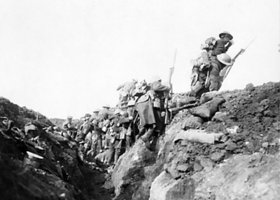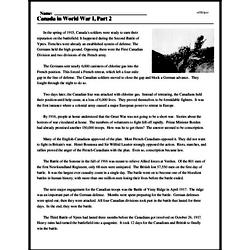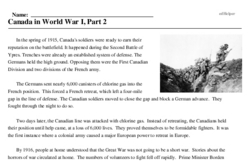Canada in World War I, Part 2
In the spring of 1915, Canada's soldiers were ready to earn their reputation on the battlefield. It happened during the Second Battle of Ypres. Trenches were already an established system of defense. The Germans held the high ground. Opposing them were the First Canadian Division and two divisions of the French army.
The Germans sent nearly 6,000 canisters of chlorine gas into the French position. This forced a French retreat, which left a four-mile gap in the line of defense. The Canadian soldiers moved to close the gap and block a German advance. They fought through the night to do so.
Two days later, the Canadian line was attacked with chlorine gas. Instead of retreating, the Canadians held their position until help came, at a loss of 6,000 lives. They proved themselves to be formidable fighters. It was the first instance where a colonial army caused a major European power to retreat in Europe.
By 1916, people at home understood that the Great War was not going to be a short war. Stories about the horrors of war circulated at home. The numbers of volunteers to fight fell off rapidly. Prime Minister Borden had already promised another 150,000 troops. How was he to get them? The answer seemed to be conscription.
Many of the English-Canadians approved of the plan. Most French-Canadians opposed it. They did not want to fight in Britain's war. Henri Bourassa and Sir Wilfrid Laurier strongly opposed the action. Riots, marches, and rallies proved the anger of the French-Canadians with the plan. Even so, conscription became law.



